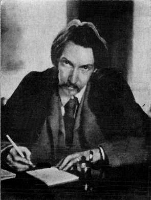Posts Tagged ‘Spectator’
RLS in the Spectator
The following post is contributed by Lesley Graham, editor of Uncollected Essays 2
Spectator archive
The full Spectator archive has just become available online. http://archive.spectator.co.uk/. I did a quick search for “Robert Louis Stevenson” and came up a number of interesting items, including the following.
22 December 1894, p. 875
On Monday, a Reuter’s telegram from Auckland announced the death of Mr Robert Louis Stevenson
[…] We have dealt elsewhere with Mr. Stevenson’s contribution to literature, and will only say here that, in spite of the extraordinary charm and vividness of his romances, and of his power of humour, his work as an essayist far more nearly approaches the ideal standard than his achievement in the field of fiction. […]
*
22 December 1894, pp. 881-82
ROBERT LOUIS STEVENSON
[clearly written before the announcement of Stevenson’s death]
WHAT is it that makes Mr. Stevenson’s literary work never wholly satisfying ? What is the something in which his books fail to content, even when they most excite, the emotions ? His romances are full of charm and of fascination. Nothing could be more vivid or more taking. The art is perfect, and dullness is banished from his page. And yet as one reads there grows the sense of some latent imperfection, some intangible fault of commission or omission which perplexes and astonishes. What can it be? Whence comes this sense that in the last resort we are cheated of the full glory of letters? [First paragraph of a longer article]
*
20 MAY 1911, p. 761
“Opinionettes”
STEVENSON coined the word ” opinionettes’ when he was twenty-one, and applied it to the obstinate little conclusions which the Edinburgh University students brought with them to college. [We quote the word from a small volume lately brought out by Messrs. Chatto and Winans (Lay Morals [and other papers], by R. L. Stevenson, 6s.) which with other matter reprints some of his earliest essays.) [First paragraph of a longer article, discussing the 1871 Edinburgh University Magazine essays and ‘Lay Morals’]
*
9 August 1934, p. 202
Gramophone Notes
SCHUMANN’S music, like the writing of Robert Louis Stevenson, suffers today from that kind of neglect which does not often permit us to make any effort to study it, even though, when by some chance we do, we seldom fail to find enjoyment in it. Stevenson’s neglect (except in schools, where the little innocents, unaffected by literary fashion, are still offered up to his cult) is probably the more general, because there is no literary substitute for a new set of gramophone records to provide the necessary incentive. So Stevenson remains unread, while a new recording of the Third Symphony —an excellent one, by Piero Coppola and L’Orchestre de la Societe des Concerts du Conservatoire (H.M.V. DB 4926-8, 18s.)—makes us turn our attention once more to Schumann….
*
26 January 1974, Page 5
Letter
Sir: Inevitable misprints apart, exactitude is almost everything. Mr Benny Green in his review on January 5 of Professor Daiches’s Robert Louis Stevenson and His World, refers to Stevenson’s use of the word ‘horologist’ in Markheim, where what Stevenson said was — “and now, and by his act, that piece of life had been arrested, as the horologist, with interjected finger, arrests the beating of the clock.”
This sentence, I suggest, is an instance of a skill which — whatever differing views there may be about its worth — Stevenson developed to a high degree and over a wide range. I can only call it an onomatopoeia not of sound alone, but of sight, action and process as well.
The quoted sentence, especially in its context, suggests the regular rhythm of a pendulum and escapement brought abruptly to a stop. (Was ‘horologist’ quite so antique a word in even Crane’s time?) “. . in my precipitous city” (dedication to Hermiston) and “wilderness of tumbled boulders” (Fontainebleau) picture in sharp or rounded vowels the scenes which they describe. The “brutal instant of extinction” (Hermiston) tells the jerking fall of a hanged man. “The sea bombards their founded towers” marks out the surges which still, as then, wash against the Bill Rock and Skerryvole. “The rain erases and the rust consumes” the inscriptions and fittings of a family tomb.
One cannot deny that there is much in the criticism of Stevenson’s use of antique words, but it is not the whole story.
W. H. McCulloch
2 Trinity Grove, Edinburgh
